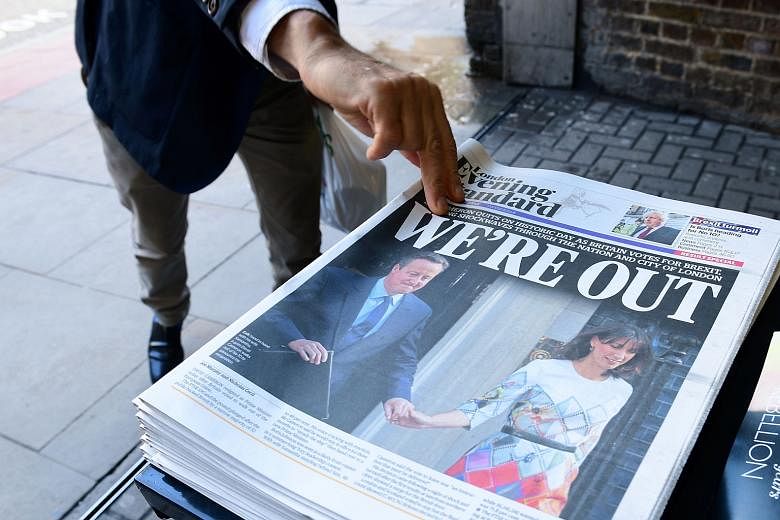LONDON (AFP) - British Prime Minister David Cameron will gather his Cabinet on Monday (June 27) at the start of a crunch week for Europe's leaders after the country's shock vote to leave the EU, seeking to head off further turmoil.
Finance minister George Osborne will also break his silence and try to reassure financial markets following the momentous Brexit vote, which has fuelled fears of a break-up of the United Kingdom with Scotland vying for independence.
US Secretary of State John Kerry is due in London later in the day after a stop-off in Brussels, while the leaders of Germany, France and Italy will meet in Berlin.
Three days after Cameron announced his resignation, opposition Labour leader Jeremy Corbyn is also facing pressure to stand down, with a string of his top team resigning on Sunday.
EU powers have called for a swift divorce amid fears of a domino effect of exit votes in eurosceptic member states that could imperil the integrity of the 28-nation alliance.
But Cameron has said negotiations on Britain's departure must wait until a successor is chosen from his Conservative party, which could be as late as October.
European Parliament chief Martin Schulz warned Sunday that a period of limbo would "lead to even more insecurity" and said a summit of EU leaders on Tuesday, which Cameron will attend, was the "right time" to begin exit proceedings.
But EU diplomats warned Sunday that Britain "may never" trigger the formal divorce process - Article 50 of the 2007 Lisbon Treaty, which will set the clock ticking on a two-year period for Britain to negotiate its divorce.
Kerry, in Rome for talks, expressed regret at Britain's decision to become the first EU nation to leave the bloc - and vowed Washington would maintain close ties with the 28-country alliance.
"Brexit and the changes that are now being thought through have to be thought through in the context of the interests and values that bind us together with the EU," he said.
Britons cast aside warnings of isolation and economic disaster to vote 52 per cent to 48 per cent in favour of quitting the EU in last Thursday's referendum.
The vote wiped US$2.1 trillion (S$2.9 trillion) from global equity markets Friday, and the pound sank to 30-year lows in early Asian trades on Monday, with traders fearing it will lead to months of uncertainty.
British finance minister Osborne is due to make a statement at 7am (2pm Singapore time) to steady nerves in the global financial hub.
The historic vote, fought on the battlefronts of the economy and immigration, exposed deep divisions in the country, which were particularly keenly felt in Scotland.
Scotland voted by 62 per cent to stay in the EU, and the prospect of being pulled out against their will has renewed support for independence.
Scottish First Minister Nicola Sturgeon has said a second independence vote was now "highly likely", and a meeting of her cabinet on Saturday agreed to start drawing up the necessary legislation.
In London, likely candidates to succeed Cameron, including Brexit campaigner and former London mayor Boris Johnson, began sounding out support over the weekend.
Johnson, a former journalist, used his regular column in the Daily Telegraph Monday to reach out to Remain voters, insisting: "I cannot stress too much that Britain is part of Europe, and always will be." But he insisted the sense of crisis was exaggerated.
At home and abroad, the negative consequences are being wildly overdone, and the upside is being ignored," he wrote.
The referendum decision has also lit a fuse under disgruntled members of the opposition Labour party, which backed the loosing "Remain" campaign, many of whom have been unhappy with Corbyn's leadership since he took office last September.
Sunday saw a string of resignations among members of the shadow Cabinet, but Corbyn issued a defiant statement saying he would not stand down.
"I regret there have been resignations today from my shadow Cabinet. But I am not going to betray the trust of those who voted for me," he said.
A no confidence motion against Corbyn's leadership is expected to be discussed at a party meeting Monday.

